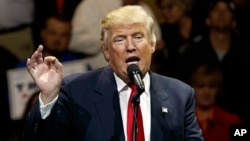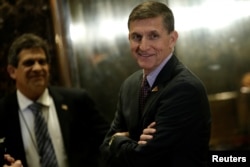U.S. president-elect Donald Trump says he would maintain sanctions against Russia imposed by the Obama administration but would consider lifting them if Russia cooperates on matters of common interest.
In an interview with The Wall Street Journal, Trump said he would keep the sanctions in effect "at least for a period of time," but might lift them if Russia helps combat terrorism and collaborates with the U.S. on other matters important to the U.S. "If you get along and if Russia is really helping us, why would anybody have sanctions if somebody's doing some really great things," he told the newspaper.
The U.S. initially imposed sanctions on Russia in 2014 after its annexation of Crimea. On December 29, President Barack Obama ousted 35 Russian diplomats from the U.S. and imposed additional sanctions in response to Russia’s apparent attempts to influence last year’s presidential election.
‘One China’ policy in question
The president-elect also told the journal that the U.S.' One China Policy, which declares Taiwan is part of China, would be up for negotiation. "Everything is under negotiation, including One China," Trump said.
Trump's latest remarks seem to depart from those his advisors made in December that a phone call from Trump to Taiwan's president did not represent a shift in U.S. relations with China or Taiwan. The call, made shortly after Trump's November presidential victory, was the first communication between U.S. and Taiwanese leaders since 1979, drawing a sharp rebuke from China.
A preview of future relations between the U.S. and Russia could be on display if the Trump administration accepts Russia's invitation to attend Syrian peace talks beginning January 23 in Astana, the capital of Kazakhstan.
Russia contacts
Sergey Kislyak, Russia's ambassador in Washington, extended the invitation in a December 29 telephone call with Michael Flynn, Trump's incoming national security adviser, according to incoming White House Press Secretary Sean Spicer. The Obama administration was not invited to the talks.
Flynn had several telephone conversations with Kislyak on December 29, the same day President Barack Obama ousted 35 Russian diplomats and imposed other sanctions in response to Russia’s apparent attempts to influence last year’s presidential election, Spicer confirmed.
Discussions between incoming administrations and foreign governments are not unusual, but multiple discussions on the day of the U.S. retaliatory actions would raise questions about whether Flynn and the ambassador discussed a possible Russian response.
Flynn’s multiple phone calls with Russia’s ambassador was first reported Thursday by Washington Post columnist David Ignatius, who wrote that the calls could be in violation of the Logan Act, a more than 200-year-old law that prohibits U.S. citizens from trying to influence foreign governments that are engaged in disputes with the U.S.
Probe to be launched
An investigation, meanwhile, will be launched into contact between the incoming Trump administration and Russia. Senate Intelligence Committee Chairman Richard Burr, a Republican, said Friday the committee will investigate "intelligence regarding links between Russia and individuals associated with political campaigns," as well as Russia's apparent meddling in last year's U.S. presidential election.
Burr and the committee's top Democrat, Senator Mark Warner, issued a joint statement indicating the panel will use "subpoenas if necessary" to get testimony from the Obama administration and Trump's transition team.
The president-elect took to Twitter again Saturday morning, this time unleashing an attack on civil rights icon and Congressman John Lewis. Lewis told NBC Friday he doesn't consider Trump a "legitimate president," and blamed Russia for helping the real-estate mogul win the presidency. Trump responded by saying the lawmaker should concentrate on serving his constituents.
Lewis, a leader in the 1960s civil rights movement, said he will not attend Trump's January 20 inauguration, the first one he will miss in more than three decades.















